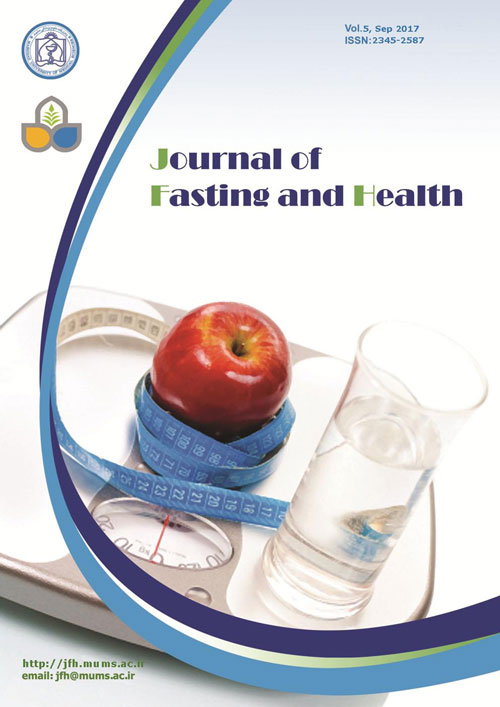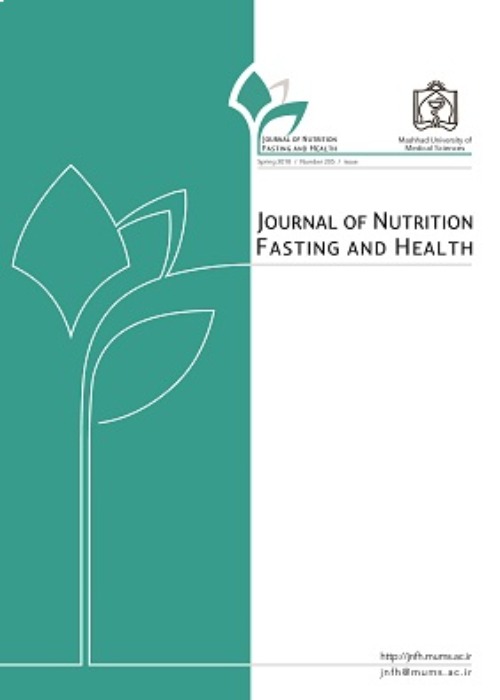فهرست مطالب

Journal of Nutrition, Fasting and Health
Volume:5 Issue: 3, Summer 2017
- تاریخ انتشار: 1396/07/30
- تعداد عناوین: 7
-
-
Pages 99-100The ninth month of Islamic calendar is known as Ramadan, in which fasting is obligatory for every adult man and woman, except in certain health conditions and during travelling. Since Islamic jurisprudence follows the lunar calendar, which is about 11 days shorter than the Gregorian, Ramadan falls in different seasons throughout the year. The duration of fasting hence may differ by 11 to 18 hours depending on the duration of the day in every country.Keywords: Ramadan, fasting
-
Pages 101-102The first International Congress of NLRCS, Nutrition, from the Laboratory to Clinical Studies was held on 6th - 8th September 2017, located in Mashhad University of Medical Sciences International Conference Center and was hosted by Mashhad University of Medical Sciences.
The purpose of the congress was to bring together cellular and molecular researchers, nutritionists, physicians, experts in food and health and other specialists to discuss the challenges of the interplay between Nutrition Sciences and medical intervention in all age groups. The meeting focused on the exchange of ideas and knowledge between the different disciplines for basic research and clinical interdisciplinary collaborations focusing on nutrition and health issues.Keywords: fasting, Ramadan, Nutrition Congress -
Pages 103-106A 23 year old female diagnosed as acne vulgaris underwent Therapeutic fasting (TF) and other naturopathy and yoga modalities for 30 days. She presented with eruptions all over her face and the face was edematous. She was given a modified diet for initial 3 days which included fresh fruits and juices along with cooked vegetables and sorghum roti. Additionally Naturopathy treatments like Swedish massage, steam bath, warm water enema and hip bath were given along with some yogic postures, pranayam and kriyas (Cleansing procedures). The patient responded well to the therapeutic fasting. By the end of 30 days there were no eruptions in her face and her skin also was clear. All the treatments were based on the principle of naturopathic medicine that the body has its own power to heal itself. TF has shown to attenuate inflammatory status of the body by suppressing pro-inflammatory cytokine expression and decreasing body fat and circulating levels of leukocytes. This is the first study to report the non pharmacological approach towards treating acne. To conclude fasting along with other naturopathy and yoga modalities has shown noteworthy changes in reducing the inflammatory response in acne vulgaris. However large scale studies are warranted.Keywords: Acne vulgaris, Naturopathy, Therapeutic fasting, Skin care, Yoga
-
Pages 107-112BackgroundThe effects of Ramadan fasting on NAFLD are unknown and there are very limited studies have done in this area. Some nutritional and behavioral changes of fasting people in Ramadan can affect NAFLD. These include nutrition with high fat and calories, altering in weight and sleep and low physical activity. We decided to evaluate the effects of these changes on one of the important indicators of deterioration of NAFLD, ALT.MethodsSixty patients with fatty liver disease performed two consecutive ALT exams before and after Ramadan month of whom finally 34 were fasting and 26 nonfasting. After collecting data they were divided in two groups of fasting and nonfasting and compared using SPSS software.ResultsMean ALT change from before to after Ramadan was higher and positive in fasting (.38±8.47 IU/L) compared to nonfastng patients that was negative (-0.12±10.15 IU/L) (P=0.002) and this change was mainly in patients who had fasted 21-30 days.ConclusionRamadan fasting may increase ALT. It is needed to perform more studies in patients with NAFLD during Ramadan fasting with larger sample size and in various conditions especially weight loss with patients education for observing dietary regimen.Keywords: ALT, fasting, Ramadan
-
Pages 113-118IntroductionMillions of Muslims across the world observe Islamic fasting during the holy month of Ramadan, as well as the other specific dates in the lunar calendar year. While fasting during this month, Muslims refrain from eating or drinking from dawn to dusk. Islamic fasting is similar to alternate day fasting (ADF) since it incorporates an average of 12 hours of fasting and 12 hours of feasting periods. This present review study is aimed to find out the common adverse health effects associated with Islamic fasting and the preventive measures to be followed to avoid them.MethodsThe literature was reviewed through searching in databases such as PubMed, Google Scholar, and reference lists to identify the related articles.ResultsMany health benefits have been attributed to Islamic fasting, including the reduced risk of cardiovascular diseases, diabetes, cancer, hypertension, and asthma. On the other hand, some studies have mentioned a few health problems associated with Islamic fasting, such as headaches, heartburn, constipation, dehydration, decreased sleep quality, and anemia, which may occur in some fasting individuals during Ramadan.ConclusionIslamic fasting could be beneficial for health if it is performed correctly. During Ramadan, fasting individuals are advised to adhere to a balanced diet that contains sufficient portions of fruits and vegetables, whole grains, pulses, meat, fish, milk, and dairy products. Moreover, fasting individuals must drink adequate fluids, such as water, fresh fruit juices, and soups, in order to prevent the possible adverse health effects associated with Islamic fasting.Keywords: Islamic fasting, Anemia, constipation, Decreased sleep quality, Headache Heartburn
-
Does Ramadan fasting influence on the levels of luteinizing hormone, follicle stimulating hormone and prolactin?Pages 117-120Adherence and obedience to the recommendations and obligations of Islam is one of the main ways to achieve a desirable lifestyle. One of them is fasting in the holy month of Ramadan, which Muslims refrain from eating, drinking, taking oral medications and smoking from Fajr (pre-dawn) to Maghrib (sunset). In Islam, it is stated that fasting is unacceptable if it is harmful or dangerous to a person's health. On the other hand, it is necessary to take into account the levels of the luteinizing hormone (LH), follicle stimulating hormone (FSH), and prolactin hormone (PRL) pituitary hormones that LH and FSH have basic role in setting of normal act of the reproductive system and the third in lactation, because the collapse of their normal levels can cause serious problems. With regards to the Islamic fasting conditions and the importance of normalization in the levels of above hormones, it should be carried out researches to determine the effects of Islamic fasting on the levels of mentioned parameters. Present study comprised a narrative review on credible published articles. These articles were collected via search in ScienceDirect, Google Scholar and PubMed. According to the results of the studies studied, we conclude that fasting during Ramadan does not have undesirable and dangerous effects on the concentration of LH, FSH and PRL.Keywords: Ramadan, fasting, Luteinizing hormone, Follicle stimulating hormone, Prolactin
-
A narrative review of food culture and eating behaviours among Mauritian Muslims during the fasting month of Ramadan: The need for nutrition educationPages 121-125Ramadan is the ninth month of the Islamic lunar calendar and is also recognised as Ramadhan or Ramzan. During this holy month, Muslims around the globe are devoted to the almighty by focusing on fasting, praying and giving charity to the poorer amongst all. Fasting being one of the five pillars of Islam, is regarded as an obligatory deed for all able-bodied accountable Muslims. During Ramadan, this category of individuals spends daylight hours observing a complete fast by abstaining from all foods, drinks, medications as well as smoking. In Mauritius, the duration of fasting will vary according to the season coinciding with Ramadan and ranges from 13 to 15 hours. In general, food intake is reduced during Ramadan. Normally, this should lead to reduced energy intake and weight loss depending on the food consumption pattern of the fasting individual. Nonetheless, eating behaviours are different during the period of Ramadan and may be accounted for the fact that following the daily fasting period, certain individuals feel indulged to consume specific types of foods and drinks at breakfast (iftaar). In Mauritius, it has long been a well anchored culture to have fried cakes and milk beverages besides the recommended dates at iftaar. It is however alarming to observe that there is a large tendency to replace dinner with the iftaar. . The review focuses on the pattern of food consumption and feast during the period of Ramadan in Mauritius and aims to justify the need for nutrition education to improve food intakeKeywords: Ramadan, fasting, eating behavior, nutrition education, Mauritius


